- Home
- Cornelia Funke
Dragon Rider Page 6
Dragon Rider Read online
Page 6
Without meaning to, Ben glanced swiftly at the place where Firedrake and Sorrel were sleeping.
“Ahaaa!” Stonebeard stepped to one side, stood on tiptoe … and gasped for breath, awestruck. His eyes were as round as marbles. He took off his huge hat, scratched his bald head, and put the hat back on.
“Hey, Leadengleam, Gravelbeard, Graniteface!” he called. “Come out from behind that rock.” He added, in devoutly hushed tones, “You’re never going to believe this. It’s a dragon! A silver dragon!”
Slowly, still on tiptoe, he crept toward the sleeping Firedrake. His friends came hurrying after him in a state of high excitement.
“Here, wait a minute!” Ben had finally recovered his powers of speech. He jumped up and moved between Firedrake and the little men. They might not be much bigger than large lemonade bottles, but all the same they raised their hammers and pickaxes and stared grimly up at him.
“Make way there, human!” growled Stonebeard. “We only want a look at him.”
“Sorrel!” Ben called over his shoulder. “Sorrel, wake up! There’s a bunch of funny little men here.”
“Funny little men?” Stonebeard took a step toward Ben. “Do you by any chance mean us? Did you hear that, brothers?”
“What’s all this racket?” grumbled Sorrel, yawning as she crawled out from behind the sleeping dragon.
“A forest brownie!” cried Leadengleam in alarm.
“Mountain dwarves!” said Sorrel. “Well, fancy that. You’re never safe from them anywhere.” With one leap she had jumped in among the little men and picked up Leadengleam by the collar. The dwarf dropped his hammer in alarm and kicked his crooked little legs in the air. His friends instantly made for Sorrel, but the brownie girl effortlessly fended them off with her free paw.
“No need to get all worked up,” she said, relieving the dwarves of their hammers and pickaxes and chucking them over her shoulder. “Don’t you know you must never wake up a dragon? Suppose he’d eaten you for breakfast? You look really juicy. Nice and crunchy, too!”
“Huh! Silly brownie talk!” said Stonebeard, scowling at Sorrel, but even so he took two tiny steps backward to be on the safe side.
“Dragons don’t eat anything that breathes,” said the fattest dwarf, taking cover behind a rock. “They live on moonlight. All their strength comes from the moon. They can’t even fly when it isn’t shining.”
“Oh, very clever, aren’t you?” Sorrel put the struggling Leadengleam back on the grass and leaned over the others. “So tell me how you knew we were here? Have we been stupid enough to land right on your doorstep?”
The four of them looked anxiously up at her. Stonebeard nudged the smallest of them. “Go on, Graniteface,” he growled. “Your turn now.”
Graniteface stepped forward hesitantly, fingered the brim of his hat, and looked uneasily up at the two giant figures facing him. “No,” he said at last, his voice trembling, “we live a good way farther up the mountain. But our scalps were prickling this morning. Usually they only do that when we’re near the castle.”
“And what does that mean?” asked Sorrel impatiently.
“Our scalps prickle when there are other fabulous beings somewhere near,” replied Graniteface. “Humans and animals don’t have the same effect.”
“Which is lucky,” sighed Leadengleam.
Sorrel looked suspiciously at the four of them.
“You said something about a castle just now.” Ben knelt down in front of Graniteface and looked inquiringly at him. “Do you mean the castle up there?” he asked.
“We don’t know anything!” called the fattest dwarf from behind his rock. “Not a thing!”
“Shut up, Gravelbeard!” said Stonebeard.
Graniteface looked at Ben like a frightened rabbit and hastily retreated to join the others. But Stonebeard took a step toward the human boy.
“Yes, that’s the castle we mean,” he grunted. “It makes our scalps prickle so hard it’s unbearable. That’s why we haven’t been there for years, even though the mountain where it stands has such a strong smell of gold it’s enough to lift the hat off your head.”
Ben and Sorrel looked up at the castle.
“Who lives there, then?” asked Ben, not liking the sound of this.
“We don’t know!” whispered Graniteface.
“No, no idea,” muttered Gravelbeard, giving Ben and Sorrel a nasty look.
“And we don’t want to know, either,” growled Stonebeard. “Evil things happen up there. We don’t want to know, do we, brothers?”
The four all shook their heads again and drew closer together.
“Sounds as if we should fly on as soon as possible,” said Sorrel.
“I told you we ought to avoid yellow!” Ben looked with concern at Firedrake, but he was still sleeping peacefully and had merely turned his head over on the other side. “We didn’t fly far enough south. But you wouldn’t believe me.”
“Yes, all right, all right!” Sorrel pensively chewed her claws. “Nothing to be done about it now. We can’t leave this place before sunset, and Firedrake needs to sleep all day or he’ll be too tired to fly tonight. Right.” She clapped her paws. “This is a good chance to stock up with provisions. How about it, boys?” She leaned down to the mountain dwarves. “Know where to find any nice tasty roots or berries?”
The four little men whispered to one another. Finally Stonebeard stepped forward, looking important, cleared his throat, and said, “We’ll show you a place, brownie, but only if the dragon will pick up the scent of the rocks for us.”
Sorrel stared down at the dwarf in surprise. “What good would that do you?”
Here Gravelbeard stepped forward, too. “Dragons can scent treasure,” he whispered. “Everyone knows that.”
“Really?” Sorrel grinned. “Who told you so?”
“It says so in the old stories,” replied Stonebeard. “Tales of the time when there were still dragons here.”
“There used to be lots of them here, lots and lots,” added Graniteface, sadly shrugging his shoulders, “but they all went long ago.” He glanced admiringly at Firedrake.
“My grandfather,” whispered Leadengleam, “my maternal grandfather, that is, he used to ride one. The dragon found him gold and silver, quartz and tourmaline, rock crystal, yellow lead ore, and malachite!” The dwarf rolled his eyes in ecstasy.
“All right,” agreed Sorrel, shrugging her shoulders. “I’ll ask the dragon when he wakes up. But only if you show me where to find something really tasty to eat.”
“Come along, then!” The mountain dwarves led Sorrel to a place where the mountain fell steeply into a valley, and they began to scramble expertly down the rock face.
Sorrel retreated from the precipice in alarm. “You want me to go down there?” she asked. “Not likely! I don’t mind a bit of climbing on mountains when they’re all rounded and soft like a cat arching its back, but I’m not going down there, no way! Suppose you boys go down on your own and find me something? I’ll wait here and call you when the dragon wakes up. Okay?”
“Just as you like,” said Leadengleam, disappearing into the depths. “But you will call, won’t you?”
“Brownie’s honor.” Sorrel was shaking her head as she watched the little fellows go. They were jumping from rock to rock as nimbly as fat flies. “I hope they know what brownies like to eat,” she muttered.
Then it was her turn to go on watch.
Unfortunately she never noticed Gravelbeard, the fattest of the dwarves, part company with the others and disappear inconspicuously beneath the branches of a fir tree.
9. Nettlebrand, the Golden One
The dwarves were right. The castle near the place where Firedrake had landed by mistake was a sinister spot — and far more dangerous for a silver dragon than for a few mountain dwarves. Its occupant took no more interest in dwarves than he did in spiders or flies. But he had been waiting for a dragon for more than a hundred and fifty years.
Rain ha
d long ago eroded the castle walls. The towers were in ruins, the stairways overgrown with thistles and thornbushes. But that didn’t bother the castle’s owner. His armor protected him from the rain, cold, and wind. Nettlebrand, the Golden One, lay in the deep, damp vaults far underground, longing for the return of the good years when the castle roof was intact and he enjoyed chasing the only prey he liked to hunt — silver dragons.
Nettlebrand’s own scales still shone like pure gold. His claws were sharper than splinters of glass, his teeth had a keen cutting edge, and he was mightier than any other living creature. But he was bored — consumed by boredom. It made him wild and savage, more ferocious than a chained dog, and so bad-tempered that he had long ago eaten most of his servants.
Only one of them was left, a spindly little manikin called Twigleg. Day in, day out, he polished Nettlebrand’s armor, dusted the spines on his back, cleaned his gleaming teeth, and sharpened his claws. Day after day, from sunrise to sunset, Twigleg worked while the golden dragon lay in his ruined castle, hoping one of his countless spies would bring him the news he had been waiting for so long — news of the last dragons, so that he could go hunting again.
On the morning when Firedrake was sleeping among the rocks only a few mountain peaks away, two spies had already come back — one of Nettlebrand’s ravens from the north and a will-o’-the-wisp from the south. But they had nothing to tell him, nothing at all, only silly stories about a couple of trolls here, a few fairies there, a sea serpent, and a gigantic bird — nothing about dragons. Not a word. So Nettlebrand ate them for breakfast, even though he knew that raven feathers always gave him terrible indigestion.
He was in a shocking temper when Twigleg, armed with cleaning cloths and brushes, bowed low before him. As usual, the manikin clambered up onto Nettlebrand’s huge body to polish the golden scales of his master’s armor from head to tail.
“Careful, you bone-brained homunculus!” Nettlebrand spat at him. “Ouch! Don’t tread on my stomach, for goodness’ sake! Why didn’t you stop me from eating that wretched black bird?”
“You wouldn’t have listened to me, master,” replied Twigleg. Picking up a green bottle, he poured some of the polish, specially made by the mountain dwarves for his master’s scaly armor, into a bucket of water. That polish was the secret of buffing the scales to such a shine that he could see his reflection in them.
“Correct,” growled Nettlebrand.
Twigleg dipped his cloth into the bucket and set to work. But when he had cleaned only three of the scales his master groaned and turned over. Twigleg’s bucket fell off and landed on the ground.
“That will do!” bellowed Nettlebrand. “You can leave the polishing for today! It makes my stomachache worse. Get on with sharpening my claws!” And he blew Twigleg off his back with his icy breath. The little creature tumbled headfirst to the cracked flagstones of the castle floor. Without a word he picked himself up again, took a file from his belt, and got to work on the dragon’s black claws.
Nettlebrand, disgruntled, watched him. “Come on, tell me something,” he growled. “Tell me about my heroic deeds of old!”
“Oh, no, not that again!” muttered Twigleg.
“What did you say?” growled Nettlebrand.
“Oh, nothing, nothing,” replied Twigleg hastily. “Right, master. Just a moment. How did it go? Oh, yes.” The manikin cleared his throat. “One cold, moonless winter night in the year 1423 —”
“Fourteen twenty-four!” snarled Nettlebrand. “How often do I have to tell you, beetle-brain?” He struck out angrily at the little man, but Twigleg nimbly avoided him.
“One cold, moonless winter night in the year 1424,” he began again, “the famous alchemist Petrosius Henbane created the greatest marvel the world has ever seen, the mightiest being, the —”
“The mightiest and most dangerous being,” Nettlebrand interrupted. “Get it right, can’t you? Or I’ll bite your spidery legs. Carry on.”
“… the mightiest and most dangerous being,” Twigleg obediently recited, “ever to set claw on this earth. He made it from a creature whose name no one knows, and he added fire and water, gold and iron, hard stone and the dew that falls on the leaves of lady’s mantle. Then he took the power of lightning and with it he breathed life into his creation, and he named his great work Nettlebrand.” Twigleg yawned. “Sorry, ‘scuse me.”
“Carry on,” growled Nettlebrand, closing his red eyes.
“Carry on, yes, sir. At your service, sir!” Twigleg stuck the file under his arm and moved over to the next paw. “That same night,” he continued, “Petrosius made twelve homunculi, little manikins, the last of whom sits here filing your claws. The others —”
“Skip that bit,” growled Nettlebrand.
“Would you like me to tell you how our creator Petrosius perished between the teeth of your noble jaws?”
“No, that’s not interesting. Tell me about my hunt, armor-cleaner, my great hunt.”
Twigleg sighed. “Soon after his creation, the magnificent, invincible, ever-shining Nettlebrand, the Golden One, set out to remove all other dragons from the face of the earth. He planned to polish them off in one fell swoop.”
“Polish them off?” Nettlebrand opened one eye. “Polish them off? What do you mean? That doesn’t sound very heroic.”
“Oh, do I usually put it some other way, master?” Twigleg rubbed his pointed nose. “It must just have slipped out. Oh, dear, the file’s broken.”
“Fetch a new one,” growled Nettlebrand. “But hurry up, or you can join your eleven brothers in my belly.”
“No thanks,” whispered Twigleg, jumping up. But just as he was about to run off, a large raven came hopping down the stone steps that led to the hidden vaults of the castle.
Twigleg was not surprised to see the raven. Those black-feathered birds were Nettlebrand’s most industrious and faithful spies — even though he was in the habit of eating some of them. But today a fat mountain dwarf was sitting on the raven’s back, and it was unusual for the dwarves to venture up here. They didn’t even deliver the armor polish themselves; one of the ravens was always sent to collect it.
The dwarf held his oversized hat on tight as the raven hopped down the steps. His face was red with excitement. At the foot of the steps he hastily climbed off the bird’s black back, took a couple of steps toward Nettlebrand, then prostrated himself flat on the floor in front of him.
“What do you want?” asked Twigleg’s master grumpily.
“I’ve seen one!” uttered the dwarf, without raising his face from the floor. “I’ve seen one, Your Goldness!”
“Seen one what?” Bored, Nettlebrand scratched his chin.
Twigleg went over to the dwarf and bent down to him. “You’d better get to the point instead of squashing your fat nose flat,” he whispered. “My master has a truly terrible temper.”
The dwarf scrambled up, looked nervously at Nettlebrand, and pointed a trembling finger at the wall behind him. “One of those,” he breathed. “That’s what I saw.”
Nettlebrand turned around. There was a tapestry on the wall, a tapestry woven by human beings hundreds of years ago. Its colors were faded, but even in the darkness you could make out what it showed — knights hunting a silver dragon.
Nettlebrand suddenly sat up. His red eyes stared down at the dwarf. “You say you saw a silver dragon?” he asked. His voice boomed through the ancient vaults. “Where?”
“On our mountain,” stammered the dwarf, straightening up. “He landed there this morning. With a brownie and a human. I flew straight here on the raven to tell you. Will you give me one of your scales now? One of your golden scales?”
“Quiet!” growled Nettlebrand. “I must think.”
“But you promised!” cried the dwarf.
Twigleg pushed him aside. “Quiet, stupid!” he hissed. “Haven’t you got any sense under that big hat of yours? You can count yourself lucky if he doesn’t eat you. Climb back on the raven and get out of here. It’
s probably just a big lizard you saw.”
“No, it isn’t!” cried the dwarf. “It’s a dragon! His scales look as if they were made of moonlight and he’s big, very big.”
Nettlebrand looked at the tapestry. He stood there motionless. Then he turned.
“It’ll be the worse for you if you’re wrong!” he said in a deep voice. “I shall squash you like a cockroach if you’ve raised my hopes only to dash them again!”
The dwarf bowed his head.
“Armor-cleaner, come here,” growled Nettlebrand.
Twigleg jumped. “The new file, the file, yes, master!” he cried. “I’ll fetch it at once. I’ll hurry, I’ll fly like the wind.”
“Forget the file,” spat Nettlebrand. “I have more important work for you to do. Get on the raven’s back and fly to the mountain where this idiot came from. Find out what he saw. And if it’s really a dragon, then find out why he’s alone, where he comes from, and what the human and the brownie are doing with him. I want to know everything, you hear? Everything.”
Twigleg nodded and ran over to the raven, who was still waiting patiently at the foot of the steps.
Disconcerted, the dwarf watched him go. “So what about me?” he asked. “How am I going to get back?”
Nettlebrand smiled. It was not a nice smile. “You’re going to sharpen my claws while Twigleg is away. You’re going to polish my armor and dust my spines, clean my teeth and pick the woodlice out of my scales. You’re my new armor-cleaner! That’s my reward for your good news.”
The dwarf looked at him, horrified.
Nettlebrand licked his lips and grunted with satisfaction.
“I’ll make haste, master,” said Twigleg, mounting the raven. “I’ll be back soon.”
“Oh, no, you won’t,” said Nettlebrand crossly. “You’ll send me news by water, understand? That’s quicker than flying back and forth all the time.”
“Water?” Twigleg made a face. “But it could be difficult to find water on the mountain, master!”
“Ask the dwarf where to look, beetle-brain,” spat Nettlebrand, turning around. Treading heavily, he lumbered slowly over to examine the tapestry with its shimmering silver dragon. Thousands of threads had gone into its weaving. Nettlebrand stood very close to it.

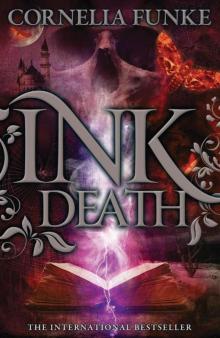 Inkdeath
Inkdeath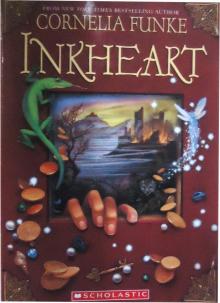 Inkheart
Inkheart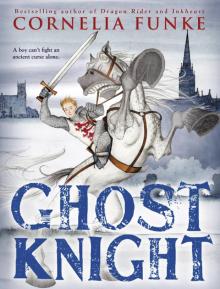 Ghost Knight
Ghost Knight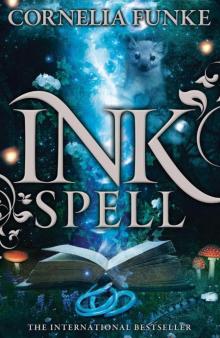 Inkspell
Inkspell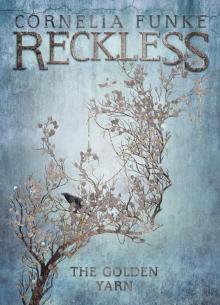 The Golden Yarn
The Golden Yarn Fearless
Fearless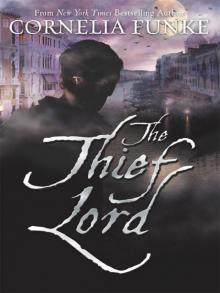 The Thief Lord
The Thief Lord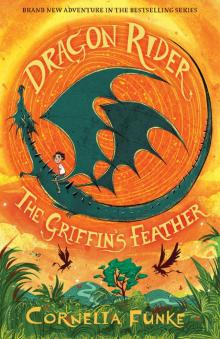 The Griffin's Feather
The Griffin's Feather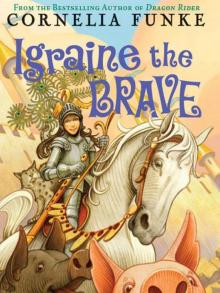 Igraine the Brave
Igraine the Brave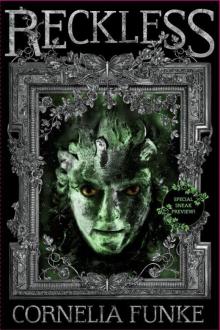 Reckless
Reckless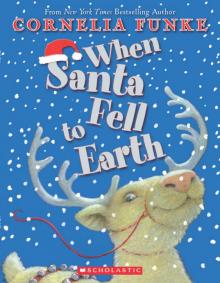 When Santa Fell to Earth
When Santa Fell to Earth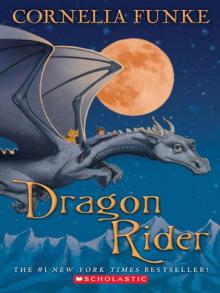 Dragon Rider
Dragon Rider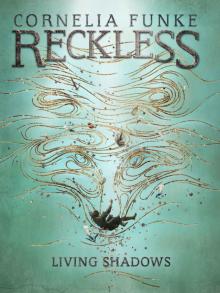 Living Shadows
Living Shadows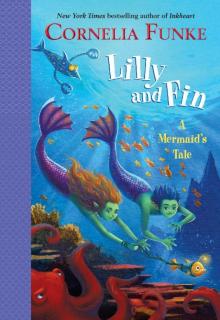 Lilly and Fin: A Mermaid's Tale
Lilly and Fin: A Mermaid's Tale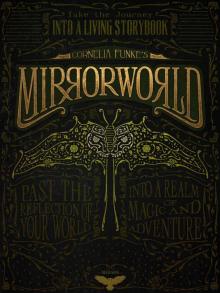 The MirrorWorld Anthology
The MirrorWorld Anthology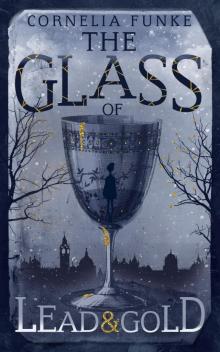 The Glass of Lead and Gold
The Glass of Lead and Gold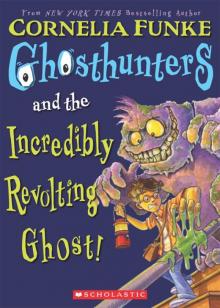 Ghosthunters and the Incredibly Revolting Ghost
Ghosthunters and the Incredibly Revolting Ghost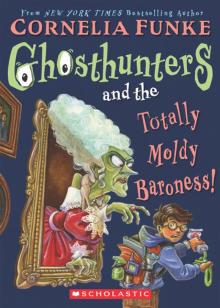 Ghosthunters and the Totally Moldy Baroness!
Ghosthunters and the Totally Moldy Baroness!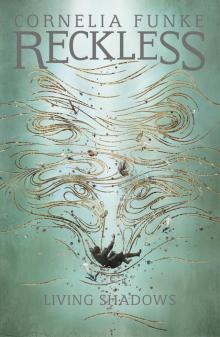 Reckless II
Reckless II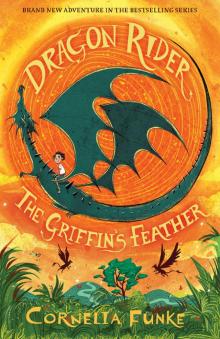 Griffin's Feather
Griffin's Feather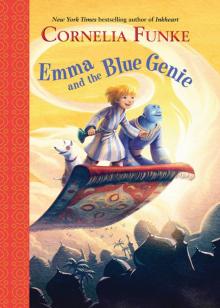 Emma and the Blue Genie
Emma and the Blue Genie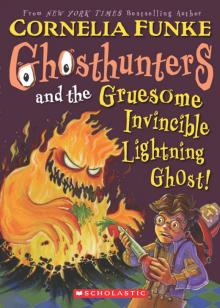 Ghosthunters and the Gruesome Invincible Lightning Ghost
Ghosthunters and the Gruesome Invincible Lightning Ghost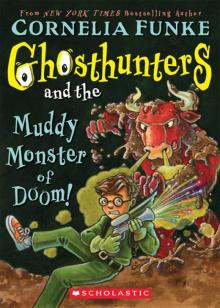 Ghosthunters and the Muddy Monster of Doom!
Ghosthunters and the Muddy Monster of Doom!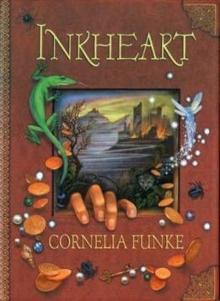 Inkheart ti-1
Inkheart ti-1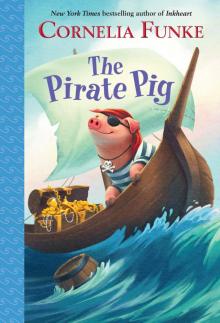 The Pirate Pig
The Pirate Pig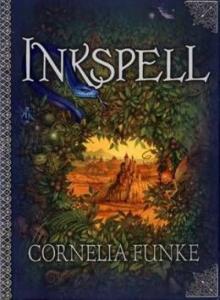 Inkspell ti-2
Inkspell ti-2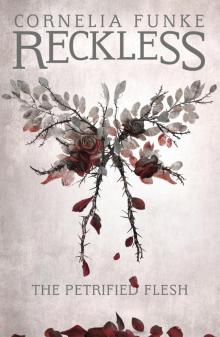 The Petrified Flesh
The Petrified Flesh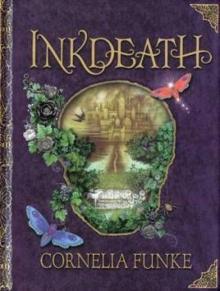 Inkdeath ti-3
Inkdeath ti-3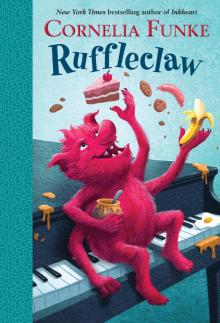 Ruffleclaw
Ruffleclaw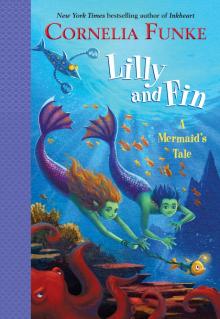 Lilly and Fin
Lilly and Fin